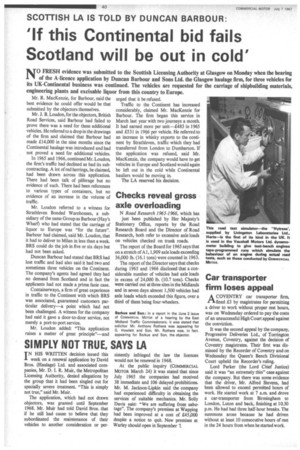'If this Continental bid fails Scotland will be out in cold'
Page 42

If you've noticed an error in this article please click here to report it so we can fix it.
NO FRESH evidence was submitted to the Scottish Licensing Authority at Glasgow on Monday when the hearing of the A-licence application by Duncan Barbour and Sons Ltd. the Glasgow haulage firm, for three vehicles for its UK-Continental business was continued. The vehicles are requested for the carriage of shipbuilding materials, engineering plants and excisable liquor from this country to Europe.
Mr. R. MacKenzie, for Barbour, said the best evidence he could offer would be that submitted by the objectors themselves.
Mr. J. B. Loudon, for the objectors, British Road Services, said Barbour had failed to prove there was a need for these additional vehicles. He referred to a drop in the drawings of the firm and claimed that Barbour had made £14,000 in the nine months since the Continental haulage was introduced and had not proved a need for additional vehicles.
In 1965 and 1966, continued Mr. Loudon, the firm's traffic had declined as had its subcontracting. A lot of red herrings, he claimed, had been drawn across this application. There had been talk of pilferage but no evidence of such. There had been references to various types of containers, but no evidence of an increase in the volume of traffic.
Mr. Loudon referred to a witness for Strathleven Bonded Warehouses, a subsidiary of the same Group as Barbour (Hay's Wharf) who had stated that the carriage of liquor to Europe was "for the future". Barbour had claimed, said Mr. Loudon, that it had to deliver to Milan in less than a week. BRS could do the job in five or six days but had not been asked.
Duncan Barbour had stated that BRS had lost traffic and had also said it had two and sometimes three vehicles on the Continent. The company's agents had agreed they had no demand from Scotland and in fact the applicants had not made a prima facie case.
Containerways, a firm of great experience in traffic to the Continent with which BRS was associated, guaranteed customers particular delivery—a point which had not been challenged. A witness for the company had said it gave a door-to-door service, not merely a port-to-port service.
Mr. Loudon added: "This application raises a matter of great principle"—and urged that it be refused.
Traffic to the Continent has increased considerably, claimed Mr. MacKenzie for Barbour. The firm began this service in March last year with two journeys a month. It had earned more per unit—£483 in 1965 and £531 in 1966 per vehicle. He referred to an increase in whisky exports to the continent by Strathleven, traffic which they had transferred from London to Dumbarton. If the application was refused, said Mr. MacKenzie, the company would have to get vehicles in Europe and Scotland would again be left out in the cold while Continental hauliers would be moving in.
The LA reserved his decision.




































































































































